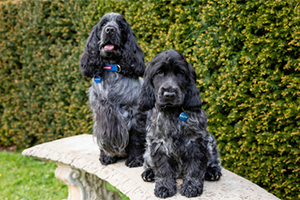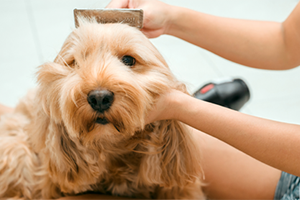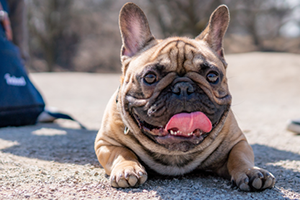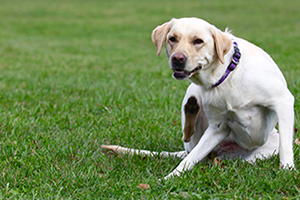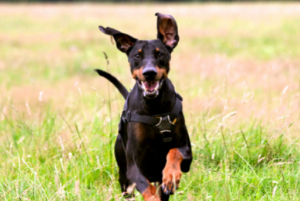
Border Terrier

A cheeky and independent family friend who’s always full of fun
Vital stats
Swipe to view more
| Size: | Small to medium |
| Coat: | Double coat, groom weekly, hand strip |
| Exercise | 1+ hours a day for a adult dogs |
| Life span: | 12+ years |
| Breed group: | Terrier |
| Temperament: | Smart, loving, cheeky |
Border Terrier temperament & personality

Sociable, playful, affectionate and cheeky Border Terriers are great family dogs for active households with lots going on. Originally bred to work alongside horses and hounds, the Border Terrier tends to get on with people and animals alike.
- Border Terriers are known for their plucky independence and they tend to be self-assured and less prone to separation anxiety than other breeds although this can make them a little stubborn.
- Terriers were originally bred to chase and drive out small animals and have a high prey drive. This is an important consideration for cat or other small animal owners as Border Terriers are prone to chase.
- The self-assured Border Terrier is unlikely to back down if challenged, so extra care should be taken when introducing them to other animals.
- Like all terriers, this breed has a loud bark and can be very vocal.
Border Terrier training & exercise

Training tips
- Keep a tasty, low-calorie treat on hand to convince a feisty Border that you’re worth listening to.
- It’s impossible to override Border Terriers’ high prey drive completely, but early socialisation is essential to avoid unwanted behaviour such as chasing and aggression.
- Spend extra time on recall training as their independent and driven nature means they’re apt to wander off.
- Border Terriers can be sensitive and respond best to positive reinforcement.
Exercise
- Adult Border Terriers need at least one hour of physical exercise per day.
- This intelligent breed also needs plenty of mental stimulation so make time for lots of games.
Keeping them happy
- Bred to find their way into tiny underground warrens, the Border Terrier is a skilled escape artist so needs a secure outdoor space to explore.
- Border Terriers are excitable well into their teens, so are best suited to owners who can give them lots of exercise and attention.
- They can also be prone to dog aggression if they aren’t given lots of proper introductions as puppies, so start training from 8 weeks old.
Game ideas
- If you feed dry kibble try spreading their meals between hiding places across the garden and let them hunt out their dinner.
- Border Terriers love to chase so ball games are a great way to make recall training fun.
Common Border Terrier health conditions

Border Terrier grooming

Border Terrier coats are thick and hardy to offer protection in the sometimes harsh climate of the border between Scotland and England.
- Border Terrier coats come in four colour varieties; dark, light, blue or tan.
- Their double coat sheds all year round and requires weekly grooming.
- Border Terrier coats are hypoallergenic and may be better suited to owners with allergies.
- Clipping Border Terriers is generally not recommended because this will cause the coat to lose its colour and texture. Instead their coats tend to be hand-stripped, a process which is best carried out by professional groomers.
Border Terrier nutrition

For little dogs Border Terriers have big appetites and can be greedy, so it’s important to monitor their food intake carefully.
- Your Border Terrier’s food needs to have enough energy to fuel their active lives, but without overfeeding.
- As this breed can be prone to developing diabetes a careful feeding regime and regular exercise are essential.
- When switching food as your dog ages, changes should be made gradually, with a feed that caters to Border Terriers’ unique needs.
What to know before you buy or rehome a Border Terrier

Thinking about welcoming a fun but feisty terrier into your household? Before you find a puppy or adopt a Border Terrier, here are a few important things to remember.
- Despite their small size, Border Terriers are cheeky, independent and extremely active little dogs and adults need at least one hour of exercise daily.
- Remember to think about the kind of dog you want. It’s important to assess the temperament of the parents (Lucy’s Law dictates that potential owners must be able to see puppies with their mum) and what breeding lines they are from. For example, a puppy bred from showing stock might be calmer and easier to manage than one descended from working dogs.
- Border Terriers are natural hunters with a high prey drive and will instinctively chase cats and other small animals unless they are introduced carefully from a young age.
- Border Terriers are escape artists and need a large, secure space to exercise in and lots of training.
- Health problems like epilepsy and otitis tend to be more common in Border Terriers. So it’s important to choose a pet insurance policy that will cover the cost of any veterinary treatment they need and ensure your pet gets the very best care.
Border Terrier frequently asked questions
Discover some of the most popular dog breeds
Border Terrier insurance considerations
We always offer these things as standard:
Physiotherapy & pet therapies
Along with physiotherapy, which is covered within the Vet Bills benefit, we also cover Pet Therapies like herbal medicine, homeopathy and acupuncture. You can also claim for hydrotherapy, up to £500 per illness/injury in dogs and cats (no additional limit for rabbits).
Petplan is a trading name of Pet Plan Limited (Registered in England No. 1282939) and Allianz Insurance plc (Registered in England No. 84638), Registered office: 57 Ladymead, Guildford, Surrey GU1 1DB.
Pet Plan Limited is authorised and regulated by the Financial Conduct Authority. Financial Services Register No. 311969. Allianz Insurance plc is authorised by the Prudential Regulation Authority and regulated by the Financial Conduct Authority and the Prudential Regulation Authority. Financial Services Register No. 121849. Pet Plan Limited is a subsidiary of Allianz Insurance plc.






































